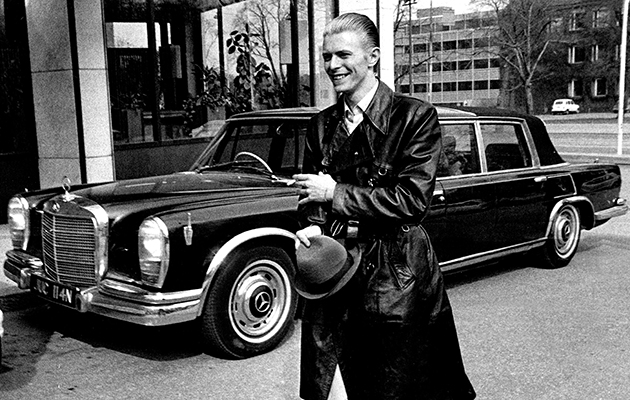Brian Eno attended one of the Wembley shows, returning to Bowie’s rented digs in Maida Vale to discuss a serious collaboration. Bowie then moved on to finish the tour in Holland and France, finally returning to Switzerland for his son Joe’s birthday party.
In the spring of 1976, Bowie stood at a crossroads. He could have returned to the US, where his commercial stock was high, and become a pampered mediocrity like Rod Stewart. Alas, that would have meant returning to LA, “The most repulsive wart on the backside of humanity… the fucking place should be wiped off the face of the Earth,” as he told Melody Maker in 1977. Alternatively, he could have settled into taxpayer-friendly domesticity in Switzerland, played happy families and become Phil Collins. Nice.
But Bowie also had another option: to rent a faceless apartment in “the most arduous city I could think of”, a magnet for druggy dropouts and draft dodgers, a hub of bohemian decadence, an island of surrealism in a country that was never supposed to exist, hemmed in by barbed wire and Cold War power politics. Plus, incidentally, the heroin capital of Europe.
Before he even had time to yodel across the placid waters of Lake Geneva, Bowie was packing his bags.
Berlin offered Bowie sanctuary from the pressures of superstardom, marital and managerial turmoil, but perhaps most of all, from himself. Or at least the grotesque caricature of a coked-up, mentally scrambled rock star that he’d become in LA. “Life in LA had left me with an overwhelming sense of foreboding,” he tells Uncut. “I had approached the brink of drug-induced calamity one too many times and it was essential to take positive action. Berlin was one of the few cities where I could move around in virtual anonymity. I was going broke, it was cheap to live. For some reason, Berliners just didn’t care. Well, not about an English rock singer…”
Although he visited several Nazi sites in Berlin, Bowie later admitted that his academic interest in Hitler suffered a fatal dose of reality after moving to Germany. “Suddenly I was in a situation where I was meeting young people of my age whose fathers had been SS men. That was a good way to be woken up out of that particular dilemma, and start to re-function in a more orderly fashion… I came crashing down to earth when I got back to Europe.”
Bowie was not alone in Berlin. Coco Schwab remained by his side, Iggy came along for the ride, and new friends like Tangerine Dream’s Edgar Froese helped ease all three into the city’s social scene. Iggy later raved about Berlin’s relaxed attitude towards “cult behaviour” in his fragmented autobiography, I Need More. “It was like a fairyland,” he gushed, “a whole deserted city… and it’s such an alcoholic city. Someone is always swaying down the street. They also don’t really care about drug traffic – or rather, they don’t care about people having fun.”
Fun was certainly on the cards when Dave’n’Ig’s big adventure first kicked off in Berlin. Although both were resolved to kick drugs, cocaine was still a feature in the early days. Dutch-born transsexual Romy Haag, who ran the Lutzower Lampe cabaret club and reportedly enjoyed a short-lived romance with Bowie, remembers Iggy and David stumbling into her bar “coked-up and wasted”. British paratrooper Stuart Mackenzie, who was briefly Bowie’s informal bodyguard in Berlin, later witnessed Iggy snorting coke from a vase while David would “booze, booze, booze” until he threw up or collapsed.
But these were early days, with the madness of LA still receding. Bowie’s new get-clean regime also involved painting and visiting museums. Berlin for him was the home of Fritz Lang and Bertholt Brecht, plus the “angst-ridden” Expressionist painting school Die Brücke, which would later inspire album sleeves for both Bowie (Low and “Heroes”) and Iggy (The Idiot and Lust For Life). “Berlin was the first time in years that I had felt a joy of life,” David says, “and a great feeling of release and healing. It’s a city eight times bigger than Paris, remember, and so easy to ‘get lost’ in and to ‘find’ oneself, too.”



